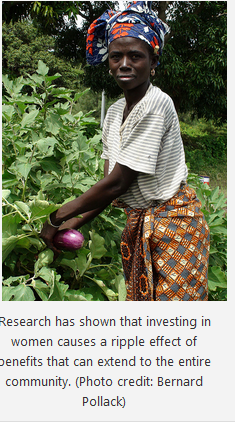 Although women farmers produce more than half of the food grown in the world—and roughly 1.6 billion women depend on agriculture for their livelihoods—they are often not able to benefit from general agriculture funding because of the institutional and cultural barriers they face—including lack of access to land, lack of access to credit, and lack of access to education. Worldwide, women receive only about 5 percent of agriculture extension services.
Although women farmers produce more than half of the food grown in the world—and roughly 1.6 billion women depend on agriculture for their livelihoods—they are often not able to benefit from general agriculture funding because of the institutional and cultural barriers they face—including lack of access to land, lack of access to credit, and lack of access to education. Worldwide, women receive only about 5 percent of agriculture extension services.
But research has shown that when women’s incomes are improved, and when they have better access to resources like education, infrastructure, credit, and health care, they tend to invest more in the nutrition, education, and health of their family, causing a ripple effect of benefits that can extend to the entire community.
In Zambia, for example, Veronica Sianchenga, a farmer living in Kabuyu Village, just 50 miles north of the city of Livingstone, was able to improve her entire family’s quality of life when she began irrigating her farm with the “Mosi-o-Tunya” (Pump that Thunders), a pressure pump that she purchased fromInternational Development Enterprises (IDE). In many parts of sub-Saharan Africa, the task of gathering water—in the driest parts of the continent this can require up to eight hours of labor per day —falls to women. The mosi-o-tunya pump not only reduced the amount of time and effort Sianchenga had to spend irrigating her garden, it also increased the amount of crops she was able to care for during a season, increasing her harvest.
Now Sianchenga has plenty of fresh produce to share with her family and is able to sell the surplus for a profit. Explaining that her children are eating healthier, with more vegetables in their diet, Sianchenga adds that she is also enjoying increased independence. “Now we are not relying only on our husbands, because we are now able to do our own projects and to assist our husbands, to make our families look better, eat better, clothe better—even to have a house.”
The benefits that Sianchenga’s family are enjoying based on her agricultural success are not unusual. And they are increasingly being recognized by funders and policy makers. Last summer, the Honorable Rajiv Shah, administrator for the U.S. Agency for International Development (USAID), introduced USAID’s new global hunger and food security initiative’s Feed the Future Guide by calling women farmers an “untapped solution” to global hunger. He went on to explain that women farmers will play an important role in future agriculture development.
As Evelyn Drawec explains in the Nourishing the Planet T.V. episode below, women farmers around the world are already playing a huge role in helping to nourish both people and the planet.

Molly Theobald is a Research Fellow with the Worldwatch Institute working with the Food & Agriculture team on State of the World 2011: Nourishing the Planet. Molly brings her skills as former Labor 2008 Pennsylvania State Communications Director for the National AFL-CIO, and her experience working on women’s issues, to her research and writing for Worldwatch where she focuses on sustainable agriculture as a means to alleviate hunger and poverty in sub-Saharan Africa. She has a BA from Sarah Lawrence College where she concentrated in Women’s Studies and Social Justice.








